

| This photo taken on Jan. 28, 2015 shows the former residence of Chiang Ching-kuo, son of former Kuomintang leader Chiang Kai-shek, at West Lake in Hangzhou, east China’s Zhejiang Province. This historical site has caused hot discussion recently since it may be turned into a McDonald restaurant. McDonald plans to open a McCafe in the structure, and the application was accepted by Hangzhou Municipal Gardens Bureau of Cultural Relics on Jan. 26, according to an announcement on the bureau's official website. The café, covering about 335 square meters, plans to serve Western-style pastry like bread and French fries. Starting from Monday, people can send their opinions and suggestions about the plan to the bureau by post or fax within seven working days. |
HANGZHOU, Nov. 18 -- McDonald's has opened an outlet in a historical residence in east China's Zhejiang Province, sparking heated debate about whether such sites should be used for commercial purposes.
The burger chain began operating in the main building of a former home of Chiang Ching-kuo, son of Kuomintang leader Chiang Kai-shek, in Hangzhou on Nov. 13, less than two months after a Starbucks opened in another section of the residence.
Chiang Ching-kuo and his family lived in the building for less than a month in 1948.
McDonald's proposed to rent the two-story house near the scenic West Lake and turn it to a 100-seat cafe in January.
The story has sparked a public uproar, with many people accusing authorities of ignoring the historic value of the buildings and risking their damage.
"Commercialization will eventually ruin the buildings," wrote someone with the screen name "Miilansmith" on microblog Sina Weibo.
"Are the authorities really in such dire need of money?" commented another.
Even Chiang Ching-kuo's grandson, Demos Yu-bou Chiang, questioned the McDonald's deal, with a microblog post on Weibo asking pointedly, "Is having a McDonald's in a historical residence or a Starbucks in a palace really an OK thing in management of cultural real estate?"
An industry insider who declined to be named said Chiang's residence had significant historical value and it is improper to use it as a commercial or private building.
But Chen Wenjin, former deputy director of the Zhejiang Provincial Administration of Cultural Heritage, defended the idea, saying that "the ownership of the residence changed several times over the past few decades. There were few historic things left."
Representatives of the Zhejiang Provincial Government Offices Administration, which owns the buildings, told Xinhua that the interior of the residence is no longer how it was when Chiang lived there.
Chen said the residence could be used for commerce if the original layout is not changed.
He admitted the possibility of commercialization ruining the buildings, and suggested "whoever rents the residence should take care of the repair work in the future."
"Government bodies should also step up supervision," Chen said.
There has been much controversy in recent years surrounding commercialization of noted buildings in China.
Starbucks caused a storm in a coffee cup in 2012 when it opened a branch in the grounds of Lingyin Temple on the bank of West Lake in Hangzhou.
In 2007, similar uproar forced the closure of a Starbucks that had operated for seven years in Beijing's Forbidden City.
Day|Week

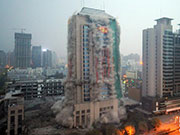 118-meter-high Never-used Building in NW. China Demolished
118-meter-high Never-used Building in NW. China Demolished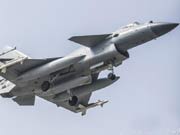 J-10B fighters with homegrown engine in test flight
J-10B fighters with homegrown engine in test flight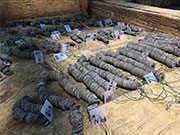 10 tons of copper coins unearthed in 2,000 years old ancient tomb
10 tons of copper coins unearthed in 2,000 years old ancient tomb Beautiful graduate from police college becomes Internet hit
Beautiful graduate from police college becomes Internet hit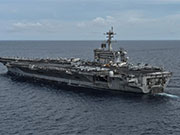 Photos of U.S. Navy intruding in South China Sea released
Photos of U.S. Navy intruding in South China Sea released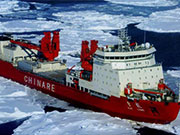 What is inside China's icebreaker ‘Xuelong’?
What is inside China's icebreaker ‘Xuelong’? Chinese, U.S. navies hold first-ever joint exercise in the Atlantic
Chinese, U.S. navies hold first-ever joint exercise in the Atlantic In pics: skies of glory
In pics: skies of glory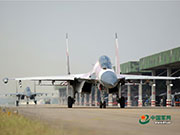 J-10, J-11, Sukhoi Su-30 fighters vs. HQ-9 anti-aircraft missile system
J-10, J-11, Sukhoi Su-30 fighters vs. HQ-9 anti-aircraft missile system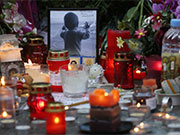 Russian plane crash victims sucked out of seats as 'external impact' blew jet apart
Russian plane crash victims sucked out of seats as 'external impact' blew jet apart